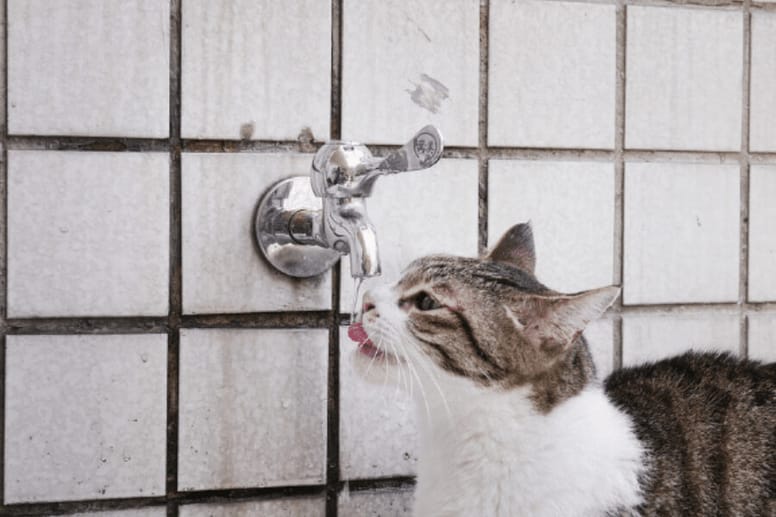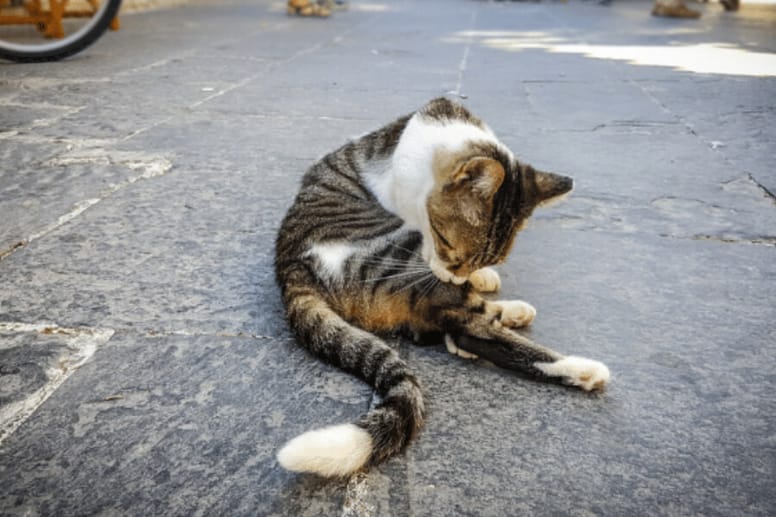What’s normal with cat poop? As a rule, if the cat is healthy, this will be at least once each day. The poo will be a deep brown colour and feel quite hard but not too mushy or soft. While some odour is normal, the poo shouldn’t be too smelly.
In contrast, if your cat is constipated, she won’t be able to perform a normal poop. She will probably strain quite a lot. If it seems like this is just an occasional problem, it’s not a worry. However, if she produces nothing in the litter box day after day, it’s time to seek medical help.
Reasons for cat constipation
# Cat grooming herself too much – results in hairballs in the digestive tract
# Kidney health issues – possible dehydration
# Colon problems – the colon inflames and doesn’t function correctly. Dry stools collect in the cat’s intestines. A tumour or narrowing of the colon
# Not enough fibre in the cat’s diet
# Pain or spine problems
# Nerve damage or neurological problems
Cat constipation treatment
A constipated cat can, of course, have underlying health disorders. A physical examination and blood and urine tests are taken, first of all, to eliminate related health conditions. Sometimes X-rays of the back legs and spine are taken too.
Many owners ask “what can I give my cat for constipation?” Well, once the Vet has ruled out any serious illness, the advice is generally to change the cat’s diet. A diet higher in fibre and a more moist feed will help in most cases.
There are also other treatments that could be recommended to help your cat’s constipation problem. Of course, these would only be done after a medical diagnosis and following professional advice.
Cat constipation remedies

No 1. Rehydration
For a cat to have normal bowel actions, it is essential she is properly hydrated. If you have offered her fresh drinking water and the problem still persists, IV fluids may be necessary.
No 2. Enema
This treatment will be given at the surgery as the cat will probably require anaesthesia. An enema procedure will help the cat to eliminate the hard stools.
No 3. Surgery
Unfortunately, sometimes a change in diet and exercise don’t improve the situation. A surgical procedure might be needed.
No 4. Change in Diet
First of all, diet plays an important role in controlling a cat’s constipation issues. A balanced diet specifically manufactured for felines is essential. A moist, canned cat food can aid the movement of hard stools. Once constipation has cleared, gradually re-introduce dry food into the cat’s diet.

No 5. Add fibre
Look for a food that has a high fibre content. Bran or even pumpkin puree will increase the fibre element into your pet’s diet.
No 6. Encourage your cat to take some exercise
Many cats are quite sedentary, quite happy to lie around on the sofa for most of the day. However, because your cat doesn’t make much movement, the colon muscles won’t work efficiently. Encourage your pet to play with her toys and tempt her to jump and chase after them around the room.
No 7. Brush your cat often

An excess of cat hair in the digestive tract can easily cause a blockage. To prevent a build-up of hairball and subsequent constipation, brush your cat daily for several minutes.
No 8. Give a cat laxative
In some cases, a laxative treatment is needed. Over the counter, mild laxative treatments are available to buy or ask at your Vets surgery for a prescription.
Is constipation a real cause to worry?
In the first place, no animal should suffer any pain. Feline constipation can certainly be a painful disorder in some cases. If you spot your cat crying or straining when using the litter box, keep note of if she manages to go to the toilet. If any other symptoms are present, such as diarrhoea, vomiting, weight loss or lack of appetite, more serious problems can entail.
At the end of the day, we all want what is best for our pets. Some of us actually know just how painful a gastric problem can be. The bottom line is that you need to discover the cause of constipation and work on a treatment and cure. Cat constipation is an unpleasant condition and the sooner you resolve the problem, the happier your cat will be.



